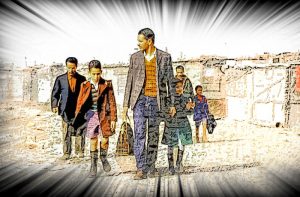 By 2020 the UNHCR (UN Refugee Agency) reported 71 million forcibly displaced people worldwide, half of whom qualify as refugees, and half of them are under the age of 18. An additional 10 million stateless people have been denied a nationality and access to basic rights such as education, healthcare, employment and freedom of movement.
By 2020 the UNHCR (UN Refugee Agency) reported 71 million forcibly displaced people worldwide, half of whom qualify as refugees, and half of them are under the age of 18. An additional 10 million stateless people have been denied a nationality and access to basic rights such as education, healthcare, employment and freedom of movement.
Many additional persons began the journey out of their homeland but died in route to another country. In a world where nearly 34,000 people are forcibly displaced every day because of conflict or persecution, the humanitarian crisis will continue to worsen.
While many view this problem as primarily a problem of the Middle East and Europe, only about 14% of global refugees attempt entry into the EU or other upper income nations (See Stiftung 2017 book in References.) An article by Patrick Kingsley notes how British and other European leaders have made extremely untrue and exaggerated claims about refugee flow into European countries. The crisis of mass displacement is a global humanitarian problem, which demands global solutions. Prejudice and xenophobic variations across nations make solving refugee issues extremely challenging.
Visionary leadership needs to be developed in setting up strong refugee systems that remain sustainable in part by reinforcing the virtues of solidarity and compassion.
This website does not advocate totally porous borders. Instead we promote humanitarian solutions to the policy crisis worldwide. Here are some concrete steps that can be taken to better resolve the global refugee crisis:
- Organize action toward a discrimination-free world. For examples of initial steps taken, see discriminationfreezone.org and http://discriminationfreeworld.blogspot.com/
- Organize resistance such as protest marches and strikes related to anti-immigrant policies. Examples are the migrant strikes and protest marches in the United States on May 5, 2017.
- Promote another “World Conference against racism, racial discrimination, xenophobia and related intolerance”, also known as WCAR. The last conference was held in 2001. It is time to hold a follow up conference.
- Wealthy nations need to pay their promised pledges for refugee aid.
- Advocate widespread education on communicating across cultural barriers.
- Use Climate of Hope approach to building a movement on inter-nation cooperation.
- Support activities that expand world peace. A good example of such activities is Alliance for Peacebuilding, an association of organizations and professional advocates.
- Mobilize support for teaching internationalism in schools around the world. An example of such effort is the Council of International Schools. One of their initiatives is the Global Citizenship project.
- Support and promote Article 7 of the Universal Declaration of Human Rights: “All are equal before the law and are entitled without any discrimination to equal protection of the law. All are entitled to equal protection against any discrimination in violation of this Declaration and against any incitement to such discrimination.”
- Promote action to support Goal 16 (Promote peaceful and inclusive societies for sustainable development, provide access to justice for all and build effective, accountable and inclusive institutions at all levels.) of the Sustainable Development Goals.
- Raise awareness and offer advocacy ideas for the alleviation of world suffering. See book by that name.
Longer-term, broader social change is needed concurrently with the above projects or proposals. Such social change must address these types of problems: cultivating the roots of socioeconomic development; improvements in education and vocational training; healthcare systems for all citizens and refugees; respect for good governance and the rule of law; respect for deep democracy; and most importantly, systems that support enforcement of civic and other human rights.
References
Stiftung, B. (2017). Escaping the Escape: Toward Solutions for the Humanitarian Migration Crisis. Gutersloh, DE: Verlag Bertelsmann Stiftung.

Comments 2
Robert Daoust — May 17, 2017
The link to http://www.allianceforpeacebuilding.org/ should be corrected.